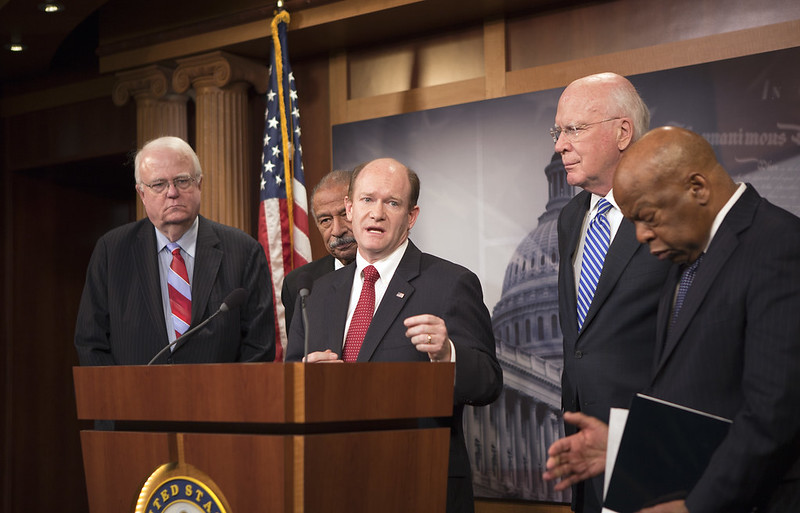
Senator Coons speaks at a press conference on Capitol Hill on Thursday with (l-r) Congressman Jim Sensenbrenner (R-Wis.), Congressman John Conyers (D-Mich.), Senator Patrick Leahy (D-Vt.) and Congressman John Lewis (D-Ga.).
WASHINGTON – U.S. Senator Chris Coons (D-Del.), a member of the Senate Judiciary Committee, joined Judiciary Committee Chairman Patrick Leahy (D-Vt.) and Judiciary Subcommittee on Civil Rights Chairman Dick Durbin (D-Ill.) on Thursday in introducing bipartisan legislation to modernize the Voting Rights Act. The bill comes seven months after the Supreme Court issued a ruling striking down a key section of the historic law. U.S. Representatives Jim Sensenbrenner (R-Wis.) and John Conyers (D-Mich.) introduced companion legislation in the House of Representatives on Thursday.
“Free and fair elections are fundamental to our democracy,” Senator Coons said. “In the seven months since the Supreme Court’s decision, proposed changes to local and state election laws have proven that the protections in the Voting Rights Act are still critically necessary. The bill we’re introducing today doesn’t look at discrimination through the lens of our past, and instead looks clearly and soberly at the modern challenges facing voters. It makes the process of protecting voting rights more transparent, and has been written in a way that is both effective and can pass in Congress. I am proud to support this bill and will work hard to ensure it becomes law.”
The legislation — supported by a range of civil rights groups — is a bicameral, bipartisan response to the Supreme Court’s Shelby County decision, which struck down a core provision in the Voting Rights Act. That provision determines how states are covered under Section 5 of the law, which requires federal preclearance to protect against discriminatory voting measures. The bill updates the coverage formula by making all states and jurisdictions eligible for the coverage formula based on voting violations in the last 15 years. States and jurisdictions that have had a clean record over the last 15 years would not be subject to coverage.
Key provisions in the bill include:
- A coverage provision based on current conditions. The bill establishes a rolling nationwide trigger that covers states or jurisdictions that have a persistent record of recent voting rights violations in the last 15 years.
- Allows our federal courts to bail-in the worst actors for preclearance. The current law permits states or jurisdictions to be bailed in for intentional violations, but the new legislation amends the Act to allow states or jurisdictions to be bailed in for results-based violations.
- Greater transparency in elections so that voters are made aware of changes. The additional sunlight will deter discrimination from occurring and protect voters from discrimination.
- Allows for preliminary relief to be obtained more readily, given that voting rights cannot often be vindicated after an election is already over.
- Includes modest provisions that continue to permit states to enact reasonable photo identification laws.
The full text of the legislation can be downloaded here.